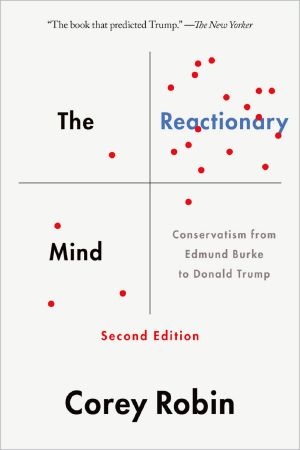The Reactionary Mind · Conservatism From Edmund Burke to Donald Trump

- Authors
- Robin, Corey
- Publisher
- Oxford University Press
- Tags
- politics , history , philosophy , psychology , poitical ideologies , conservatism , non-fiction
- ISBN
- 9780190692001
- Date
- 2011-08-08T23:00:00+00:00
- Size
- 0.37 MB
- Lang
- en
Late in life, William F. Buckley made a confession to Corey Robin. Capitalism is "boring," said the founding father of the American right. "Devoting your life to it," as conservatives do, "is horrifying if only because it's so repetitious. It's like sex." With this unlikely conversation began Robin's decade-long foray into the conservative mind. What is conservatism, and what's truly at stake for its proponents? If capitalism bores them, what excites them?
In The Reactionary Mind, Robin traces conservatism back to its roots in the reaction against the French Revolution. He argues that the right was inspired, and is still united, by its hostility to emancipating the lower orders. Some conservatives endorse the free market; others oppose it. Some criticize the state; others celebrate it. Underlying these differences is the impulse to defend power and privilege against movements demanding freedom and equality — while simultaneously making populist appeals to the masses. Despite their opposition to these movements, conservatives favor a dynamic conception of politics and society — one that involves self-transformation, violence, and war. They are also highly adaptive to new challenges and circumstances. This partiality to violence and capacity for reinvention have been critical to their success.
Written by a highly-regarded, keen observer of the contemporary political scene, The Reactionary Mind ranges widely, from Edmund Burke to Antonin Scalia and Donald Trump, and from John C. Calhoun to Ayn Rand. It advances the notion that all right-wing ideologies, from the eighteenth century through today, are improvisations on a theme: the felt experience of having power, seeing it threatened, and trying to win it back. When its first edition appeared in 2011, The Reactionary Mind set off a fierce debate. It has since been acclaimed as "the book that predicted Trump" (New Yorker) and "one of the more influential political works of the last decade" (Washington Monthly). Now updated to include Trump's election and his first one hundred days in office, The Reactionary Mind is more relevant than ever.
"The Reactionary Mind has emerged as one of the more influential political works of the last decade."—Washington Monthly
"Robin is an engaging writer, and just the kind of broad-ranging public intellectual all too often missing in academic political science. Robin's arguments deserve widespread attention."—The New Republic
"A very readable romp through the evils of Conservatism."—The Observer
"The common opinion on the Left is that conservatives are fire-breathing idiots, who make up in heat what they lack in light. Robin's book is a welcome correction of this simplistic view and puts the debate where it ought to be: on the force and content of conservative ideas."—Dissent
"This little book will continue to spark controversy, but that is not the reason to read it: it is a witty, erudite and opinionated account of one of the most significant movements of our times."—Times Higher Education
"...written with panache. The series of scholarly strikes Robin makes against conventional wisdom are often exhilarating."—The Daily
"The Reactionary Mind is a wonderfully good read. It combines up-to-the-minute relevance with an eye to the intellectual history of conservatism in all its protean forms, going back as far as Hobbes, and taking in not only restrained and sentimental defenders of tradition such as Burke, but his more violent, proto-fascist contemporary Joseph de Maistre. Some readers will enjoy Corey Robin's dismantling of different recent thinkers—Barry Goldwater, Antonin Scalia, Irving Kristol; others will enjoy his demolition of Ayn Rand's intellectual pretensions. Some will be uncomfortable when they discover that those who too lightly endorse state violence, and even officially sanctioned torture, include some of their friends. That is one of the things that makes this such a good book."—Alan Ryan, Professor of Political Theory, Oxford University
"A fascinating exploration of a central idea: that conservatism is, at its heart, a reaction against democratic challenges, in public and private life, to hierarchies of power and status. Corey Robin leads us through a series of case studies over the last few centuries—from Hobbes to Ayn Rand, from Burke to Sarah Palin—showing the power of this idea by illuminating conservatives both sublime and ridiculous."—Kwame Anthony Appiah, Professor of Philosophy, Princeton University
"It is a thoughtful, even-tempered sort of book. The old maid tendency that dominates liberal polemic in the U.S.—the shrieking, clutching at skirts, and jumping up on kitchen chairs that one gets from a Joe Nocera, a Maureen Dowd, or a Keith Olbermann—is quite absent. "—The American Conservative
Corey Robin teaches political science at Brooklyn College and the CUNY Graduate Center. His writings have appeared in the New York Times, Harper's, and the London Review of Books.